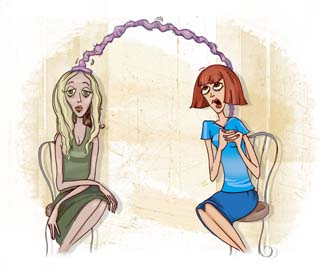As someone rightly says, friends are the family we choose for ourselves. In times of stress or when we feel sad or anxious, all we need is a BFF.
Your best friend knows a lot about you, at times even more than yourself and vice versa. Crushes and romances might come and go, but friends are there through it all, they support and hold us up always. However, even the strongest of friendships can turn sour. There could be many reasons for it, betrayal, personal issues or simply moving in two different directions in your lives. And sometimes someone you thought was a true best friend turns out to be not really a friend at all — which can be even heartbreaking.
So, how to tell if you just hit a bump on the road? Or, if your friendship is going in an unhealthy direction? The distinction between these two can be pretty subtle. Here’s everything you need to know about coping with a toxic friendship.
What is a toxic friendship?
“A toxic friendship is an unhealthy relationship that hurts you emotionally and can result in things like low self-esteem, self-isolation, and acting in ways you otherwise wouldn’t,” Nitasha Shetty, assistant professor of psychiatry at Columbia University Medical Center and director of psychiatric services at CUCARD, explains.
A toxic friendship is a bad friendship with the added element of being emotionally unhealthy. Mental health includes your emotional, psychological, and social well-being.
HOW DO YOU KNOW IF YOUR FRIENDSHIP IS TOXIC?
Here are some major warning signs you should be on the lookout for…
Pay attention to your feelings, “Pay attention to how you feel before, during and after you spend time with this friend,” says Shetty. “People in toxic relationships might feel nervous, on-edge, frustrated, ignored, ridiculed or guilty.”
You Don’t Like The Person You Become Around Them, If you’re not being you when you’re around your friend, there’s a chance that something’s up.
They Make You Feel Emotionally Exhausted
You Rarely Hang Out With Your Other Friends Anymore
You’d Never Treat Someone The Way This Friend Treats You
You’re Putting In More Than You’re Getting Out, “A strong friendship is mutually beneficial — it shouldn’t be one-sided,” says Shetty. “If you feel like you’re taking on a lot of care for the other person and it’s not reciprocated, that’s not a good sign.”
HOW DO YOU DEAL WITH A TOXIC FRIENDSHIP?
Let’s say you’re starting to feel like this friend really is toxic… what next? Well, you can handle this situation a few different ways.
Get Some Space
To start, try spending a little less time with this person and clock how you start to feel. Are you happier? Do you feel less stressed? That’s a sign that the friendship really was taking a toll on you, and you can look forward to better days as you continue to gain distance from that person.
Revisit Your Friend Network
Now that you’ve distanced yourself a little, reach out to other people in your network. While a toxic friend might try to make you feel like you’re alone in the world, you’re not.
Re-evaluate Your Friend Group
If your toxic friend is part of a larger friend group, then you may need to distance yourself from them.
Cut Them Out Of Your Life and Move On
Let’s say you get the strength to cut this toxic person out of your life (go you!)… now what? Well, first things first, take a deep breath. “Give yourself time and remind yourself that you’re not alone,” says Shetty. Friendship breakups can feel like romantic breakups, even if they’re for the best. You might cry over losing this friend. You might feel sad for days. You might be jealous of the new people they start hanging around with, and that’s completely normal.
At the end of the day, friends come and go, but the one relationship that remains constant is the one you have with yourself. If you feel like you’re being disrespected, be kind to yourself and move away from the bad vibes so you can be closer to people who really deserve your time

